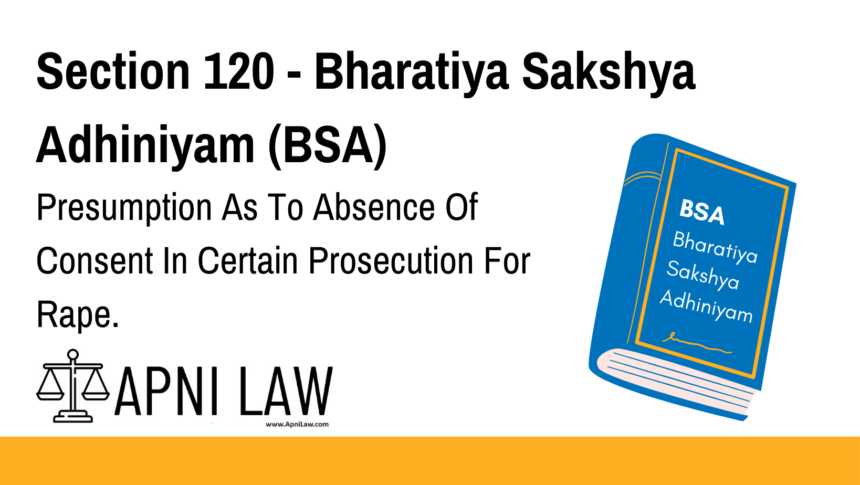Code: Section 120 – Bharatiya Sakshya Adhiniyam (BSA)
In a prosecution for rape under sub-section (2) of section 64 of the Bharatiya
Nyaya Sanhita, 2023, where sexual intercourse by the accused is proved and the question
is whether it was without the consent of the woman alleged to have been raped and such
woman states in her evidence before the Court that she did not consent, the Court shall
presume that she did not consent.
Explanation.—In this section, “sexual intercourse” shall mean any of the acts
mentioned in section 63 of the Bharatiya Nyaya Sanhita, 2023.
Read more:
—
Explanation of Section 120 – Bharatiya Sakshya Adhiniyam (BSA)
Section 120 of the Bharatiya Sakshya Adhiniyam introduces a key evidentiary presumption in rape prosecutions. When the sexual act (as defined in Section 63 of the BNSS) is proven and the issue in question is whether it occurred without the woman’s consent, this section mandates the court to presume absence of consent—provided the woman states so during her testimony.
This shifts the burden onto the accused, requiring them to rebut the presumption of lack of consent. The provision is specifically applicable to cases under Section 64(2) of the BNSS, which relates to rape by persons in positions of power, authority, or trust.
Key Points:
- Applies only to prosecutions under Section 64(2) BNSS.
- Presumption arises only after sexual intercourse is established.
- The woman’s clear statement of “no consent” triggers the presumption.
- The court is required to presume absence of consent—this is not discretionary.
- The accused may still rebut the presumption with credible evidence.
—
Illustration
Example 1: Teacher-Student Case
A teacher is prosecuted under Section 64(2) of the BNSS for raping a student. The student testifies in court that she did not consent. Once the sexual act is proved, the court must presume that the act was non-consensual.
Example 2: Abuse of Official Position
A jail warden engages in sexual activity with an inmate and is prosecuted under Section 64(2). The inmate states in court that she did not consent. Since the sexual act is proven, the court shall presume lack of consent.
—
Common Questions and Answers on Section 120 – Bharatiya Sakshya Adhiniyam (BSA)
1. Does the court have discretion in applying this presumption?
No. The language of Section 120 uses “shall presume,” making it mandatory once the required conditions are met.
2. Is this presumption final?
No. It is a rebuttable presumption. The accused can present evidence to prove that consent existed.
3. Does it apply to all rape cases?
No. It specifically applies to cases under Section 64(2) of the BNSS, which involves rape committed by persons in positions of authority or trust.
4. What qualifies as “sexual intercourse” under this section?
“Sexual intercourse” is defined in Section 63 of the Bharatiya Nyaya Sanhita and includes various penetrative sexual acts.
5. Why is this presumption necessary?
This provision aims to protect women in situations where power imbalance makes it difficult to prove lack of consent through direct evidence.
—
Conclusion
Section 120 of the Bharatiya Sakshya Adhiniyam serves as a critical protection in rape prosecutions involving abuse of authority. It ensures that the testimony of the woman regarding lack of consent is given legal weight once the sexual act is proven. By mandating the court to presume absence of consent, the law addresses the inherent power imbalance in such cases and strengthens the legal framework for justice.
For more structured legal analysis and detailed guides on Indian laws, visit ApniLaw.













